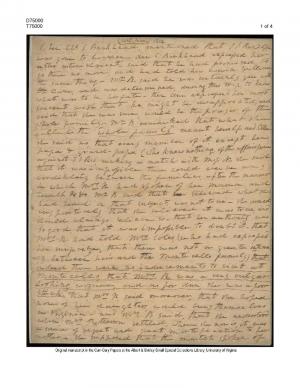Description of Conversations about Jane H. Nicholas (Randolph)
| 21st June [1813?] |
When Chs L. Bankhead, mentioned that T. J. Randolph was gone to Warren—Ann. C. Bankhead expressed her utter astonishment—said that he had promised to go there no more, and had told her Cousin William the same thing. Mr. B said he was certainly gone with Dr. Carr, and was determined during this trip, to know what was to be his fate. then Ann expressed her most fervent wish that he might be disappointed, and said that she was sure, would be the prayer of the whole family. Mr. B remarked that what she called the “whole family” meant herself and Ellen. she said no, that every member of it, except her Papa and Grand-papa (who knew nothing of the affair) were against T.J.R.’s making a match with Miss N—. she said that it was impossible there could ever be any cordiality between the families, after the manner in which Mrs. N had spoken of her Mama and herself &c &c. Mr. B said that he believed what she had heard on that subject, was not true—she avered very positively that she believed it was true, and should always believe so. that her authority was so good, that it was impossible to doubt it—that Mrs. N had told Mrs. Coles, (who had expressed her surprize, that there was not a greater intimacy between her’s and the Monticello family) “that indeed there were no inducements to visit at Monticello, that Mrs. R was a very vulgar-looking woman, and as for Ann, she was a poor stick.” That Mrs. N. said moreover, that she hoped none of her daughters would bury themselves in Virginia—and Mrs. B said that she understood when Mrs. Patterson settled, where she now is, it was a source of regret and great mortification to her mother—she supposed that the match spoken of could not be agreable to Mrs. N. herself, that Jefferson could expect no more than he had at present (a small tract of land & five negroes—two of them worse than nothing) that it was very strange that so prudent a young man as Jefferson, who had always complained how badly off he had been, that he was now in debt &c &c, should at this time, when his father was going away, and when his attention would be so much wanting to his affairs, think of involving himself farther—She asked, what home had Jefferson, to which he could carry a wife? For she knew him so well that she was certain he would be satisfied no where except in a house of his own—She went on to say, that if not withstanding all this, J. should still marry Miss N. that Jefferson’s sister’s would treat her with civility on his account—and that her mother had said she should receive her as a daughter and treat her with affection—But she said they all wished, that Jefferson’s wife, should be one that they could love as one of themselves, and insinuated strongly that this could never be the case with Miss N.. She went on to say that Jefferson’s conduct was incorrect, and highly improper indeed, in another most important point. that he was not in the least attached to Miss N., that he was yet warmly attached to Miss M. E. and she to him—that he never could love any one as well—that Miss E. had wished her sister to send a messenger to Jefferson with a message to this affect. that within a week, Jefferson had spoken of her, and of his attachment to her with tears in his eyes, and indeed could never speak of her in any other manner—that she, Miss E. would have been a match, entirely agreable to the whole family—that her mother (Mrs. R) had her heart set upon it—she said moreover, that Miss E. was beautiful, and remarked the difference, in Jefferson’s manner of speaking of her, and of Miss N.—that he spoke of her as an angel, whereas he said, of Miss N., that she was a very ordinary girl—and all the young men, who knew her, considered her very homely. In the course of her conversation she said if Jefferson married Miss N. he would repent of it, all his life—that it was natural to judge of the daughter from the mother &c &c—that they had all given their opinions very freely to Jefferson on the subject—she said she thought he ought to give Miss N. a full statement of his fortune and expectations, and if he did, that would quickly settle the business. that Mrs. N. speaking of Mr. Burwell’s attachment to her daughter Polly, had said “to think of Billy Burwell’s impudence to court Polly” and remarked that Burwell had ten times as much as Jefferson would have &c &c—
